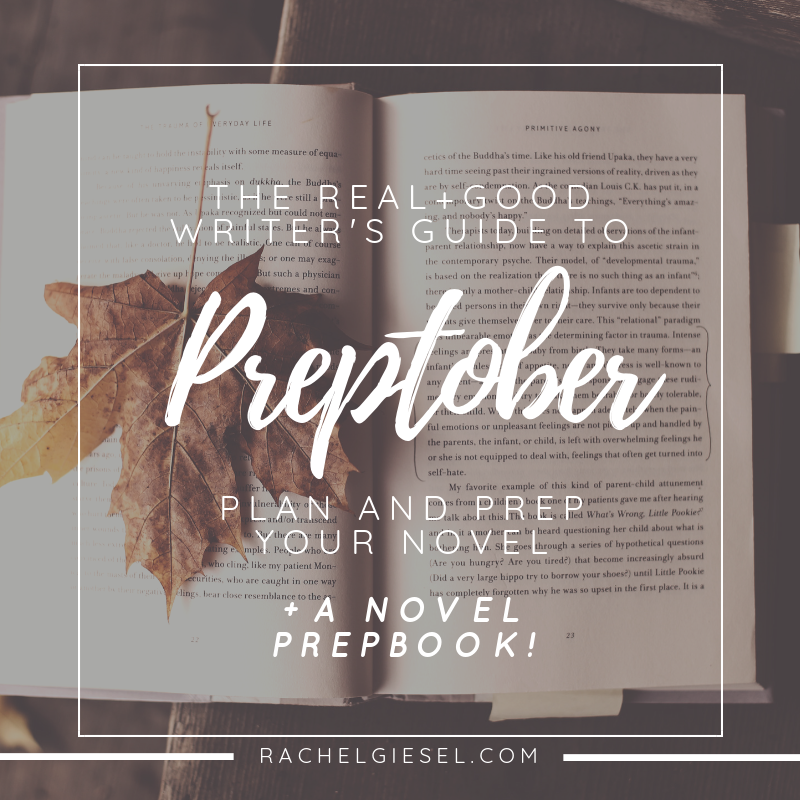You're a writer. That much is clear. If you weren't, you wouldn't be here on this blog, would you?
But why are you a writer? Why do you do what you do? Writing is hard (really freaking hard); so why do we do it at all? Why do we torment ourselves with the inner editor? Why do we keep going even when we doubt if we're any good? Why do we spend so much time arranging little characters in certain orders to create meaning, when we could be doing so many other things?
You might answer, "Because I like it." Which is a fine answer to have, until you've hated the words that appeared on the page. Until you think your story sucks. Until you don't feel like writing at all. Until you don't like it and would prefer doing the worst chore on your to-do list (aka dishes) to avoid writing. That "like" isn't pulling you through. That "like" won't get you through all the tough times. That answer doesn't hold.
You might answer, "Because it's fun." Another fine answer, and this is true most of the time. In fact, this is the goal. It works, until you have a deadline looming over your shoulder and inspiration won't strike and you start to guilt-trip yourself about not writing and so you pressure yourself to make words come out and then you think those words suck. You end up in the same boat as above. And that's not very fun.
You might answer, "Because I'm a writer." Okay. This might work. A writer is someone who writes. If you write, you must be a writer. Fair enough. But why did you decide to be a writer? (And when?) What drew you into writing in the first place? You must've tried it once (and for what reason?) and then it became a thing that you did. But why did you continue doing it?
When you're a writer, there are going to be a lot of times when you don't like writing. There are going to be a lot of times that aren't very fun. There are going to be a lot of struggles as you plow away through draft one, draft two, revised draft seven, revised draft twenty-four. You are going to face doubts whether you're any good. You're going to face fears that you'll never succeed. You're going to get rejected. You're going to write a lot of wasted words. You're going to fail with some stories. You're going to struggle. A lot.
But if you are a writer, truly, you will pull through.
How? By setting serious intentions and knowing your why.
If you want to take your writing seriously, you've got to have serious intentions. Intentions are more than just something you say you're going to do. You could intend to do the dishes or you could intend to run a marathon. But if you don't actually care about them, if you don't have passion and love and excitement that are forming those intentions, they won't get done.
Real+Good Intentions are built with love, dreams, purpose, beliefs. Intentions are focused goals, focused bits of passion, specific and beautiful and crazy wild dreams that you're going to put into action.
The difference between failing and succeeding with your intentions is the why. You have to know why you're doing this in the first place, or else the whole thing is meaningless and nothing will end up getting done.
Your why is your reason for doing this, your purpose. Your why is what motivates you, what drives you. Your why is what keeps you going when things get really tough. Your why is your fuel to get you started and keep you going. Your why is your most necessary ingredient for success. Your why is your identity, who you are deep down inside your subconscious, that little piece tied to your heart and soul.
You need your Why when:
You Start:
Your why will be there to get you started. Before you start writing, you don't have to know what you're doing, but why you're doing it. At this very early stage, you won't have all the answers, but you will have something at your core, in your soul, that's driving you to move forward. That's the why.
While You Work:
Your why will be there to help drag you through the middle. After you've been working on a draft for a while, your motivation, all that energetic excitement that you started with, will wane. The newness wears off and writing becomes tough. When you feel like giving up, your why will pull you through.
When You Struggle:
Your why will be there when you're hard on yourself as well. When your brain is being a jerk to you and you're paralyzed by the self-doubt that comes with imposter syndrome, your why will pick you up, dust you off, and get you going. Your why will give you purpose and strength.
Your why is basically your best friend. Do you know yours?
George Orwell + The Big 4
"Why do you write?" is a common question that gets asked of all the master writers. Everybody wants to know the answer. Why would you torment yourself with this story for 10 years? Why would you devote your time to something this crazy and frustrating? Why didn't you give up when times were difficult? Why did you even start at all? If you Google "why I write" you will find hundreds and hundreds of essays where writers try to answer this as best as they are able. But it's really a complicated question, and a deeply personal one.
We can't talk about the why in writing without talking about George Orwell. Famously known as the initiator of the "Why I Write" prompt, Orwell suggests there are only four main reasons why people become writers.
“There are four great motives for writing, at any rate for writing prose. They exist in different degrees in every writer, and in any one writer the proportions will vary from time to time, according to the atmosphere in which he is living.”
George Orwell's 4 Motives:
1 | Sheer Egoism
It may be a basic human desire to be well-liked, known, remembered, and venerated. But Orwell believed that writers took this desire a step farther. We want to feel smart, we want to be successful, we want to achieve great things. This may not be a glamorous reason to write, but as Orwell says, "It is humbug to pretend this is not a motive, and a strong one" (Orwell). Perhaps, part of the reason we write, is because we're determined to show our true selves and please our desires to be admired for it.
2 | Aesthetic Enthusiasm
Perhaps we write because of the beauty of the words themselves. Doesn't it just feel good when you find the right word in a sentence? Doesn't it just feel wonderful when you read something that flowed naturally? Orwell argues that we seek the "pleasure in the impact of one sound on another, in the firmness of good prose or the rhythm of a good story". We like to perceive beauty "in words and their right arrangement" (Orwell). Perhaps this is how we originally fell in love with writing, the playing and rearranging and magical beauty we could create through our language.
3 | Historical Impulse
I'm sure you've had some stories that were truth-seekers. I'm sure you've turned to writing to sort out a problem, to gain clarity, to document what's happening in the world around you. Orwell believes that we have this desire to "find out true facts and store them up for the use of posterity," documenting our world so we can remember what it's like later and preserving our name so we have a legacy across time (Orwell). In fact, everything you write does this. By capturing emotions and images and thoughts onto the page, we are constantly creating little time capsules of what life was like, whether it was actually real or imagined. (P.S. This is one of my biggies – one of my core phrases for "being a writer" is that I want to capture reality authentically and genuinely through the written word).
4 | Political Purpose
With this one, Orwell does not mean that you're a politician. He even begins by saying that he's "using the word 'political' in the widest possible sense" (Orwell). What he actually means by this point is that you may be writing because you want to change the world. You have big beliefs about things and you want to share them with anyone and everyone who will listen. You have the "desire to push the world in a certain direction, to alter other people's idea of the kind of society that they should strive after" (Orwell). You have the ability, through writing, to communicate thoughts, ideas, and emotions. And you want to communicate those for the betterment of our world. You want to touch the souls of your readers. You want your readers to consider their own lives and be better people. You want to impact the world, and you want to do it through a written medium.
“It can be seen how these various impulses must war against one another, and how they must fluctuate from person to person and from time to time. ”
There will be times when you write for a sense of play. There will be times when you write to change the world. There will be times when you write because you want to document the truth. And there will be times when you write for the sake of yourself. These are all great reasons to write. Are they true for you?
After Orwell
After George Orwell's essay, writers started trying to discern exactly what made them tick. Like I said, you can find a million bajillion of them on the internet. Here's a good starting place for your own research:
What's interesting is that nearly every single writer mentions some kind of struggle with the writing process. There's this universal truth that writing is a complicated and crazy thing, and yet we do it anyway. Most of these writers look back through their personal history to try to make sense of why they do this crazy thing day after day. And the answers aren't uniform. They're very specific to the person themselves. Writing is such a unique and personal experience, how could it not be uber-specific to the self?
You need to know your Why
When fears, uncertainties, and doubts strike, and they will, what will keep you writing? When writer's block slams into you like a brick wall, what will keep you writing? When you don't feel like it, when you want to give up, when it's not very fun, what will keep you writing?
Your why.
Take some time to figure it out. It will be the fuel to pull you out those slumps when the goings get tough.
How to find your Why
First, start by studying other writers. See what their reasons and motivations are. Learn their histories. Study their journey. (Also, the essays they write are just beautiful and inspiring to read).
Then, think about your own journey. Think of your childhood self's relationship to writing. Think about when you first discovered writing. Think about the first story you ever wrote. Think about the moment you started calling yourself a "writer" and how that came about. Think about what you want from writing. Think about why you turn to writing at all. Think about your future with writing and what might happen, what you would like to happen. Think about how writing has helped you or healed you. Think about what you're writing and why you feel the need to write about it. Think about what stories you want to tell and why you want to tell them.
Finally, craft your own "Why I Write" essay. Put it in a place where you'll be reminded of it often.
The best stories come from within yourself. They come from your subconscious, your primal brain. They come from your heart, your soul. They come from something deep deep inside you. To discover them, it all starts with why.
Happy (+Productive) Writing!
♥
Why do you write? Have you ever written a "why I write" essay? What did you discover when you started considering your why?















